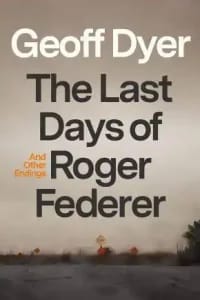Time seems vast at first, when we begin our journey. And then, it shortens. Champions age. There is no guarantee of longevity at the start of one’s career. And yet, the artists, sportspersons and influencers we appreciate the most, are defined by their longevity. The Last Days of Roger Federer: And Other Endings explores longevity in an entirely new way. The quandary Geoff Dyer has explored in this book, is whether you can see it coming and how you respond to it.

The premise of the book by itself is challenging – Dyer has set out to write a book about famous endings. But what he is truly drawn to is endlessness, to the way that one thing leads to another. At its core, The Last Days of Roger Federer: And Other Endings is an exploration of mortality. The prose sparkles with rich insights and the author suggests that a life well-lived is worth the most unkind of endings.
Dyer’s canvas, of course, is beyond just Federer; he touches upon jazz, Dylan, movies, drugs, Nietzsche, Beethoven. Five takeaways from the read –
What keeps you hooked to the book is Geoff Dyer’s unquenchable curiosity. He’s asking the questions you want to ask and comes up with a unique collection of thoughts, memories, analyses in his essays – shall we call them that?
Dyer candidly admits to putting down a book if it’s not working for him, walking out of a movie, just quitting when he hits the realisation that life is too damn short to waste. I bet you can relate to this. Spend every minute like it matters is a big message in the book.
Dyer has the uncanny knack of making the reader feel smart. Trust me, this is a very selfless approach. The author surrenders himself at the altar of the reader. The capturing of information is treated as teamwork and delivered with light hearted amusement. One is reminded of Malcolm Gladwell, who has mastered this art.
You feel bad when the book ends and you wonder why the author left out your favourite celebrity – for instance, I wanted to know if the author had a point of view on the endlessness of Lata Mangeshkar. At some level, the marginalisation of achievements by those who are not from Europe or America is only amplified by such books. The world has become a global canvas now and each and every part of the world deserves to be represented by a witty, insightful author such as Dyer.
The certainty of ageing and finality of death occupies a share of our minds, especially as we encounter late middle age. As we hold on to what defines us, we modify our experiences, when an ending is within sight. This philosophy emerges strongly from the book.
If you’ve picked up this book because it’s written by Geoff Dyer, that’s completely understandable. After all, Dyer’s books have been translated into 24 languages. The man has set standards in prose writing in the English language. And if you haven’t read any of his nine non-fiction books, this is as good a beginning as any other. Because this category-defying piece of writing cannot sit in biography or self-help and yet has elements of both.
What is compelling is that Dyer focuses on the accomplishments of uncouth geniuses who wrote their own rules when their beautiful youths were over. How much of that resonates with his own life? Maybe this is beyond Nietschze after all!

